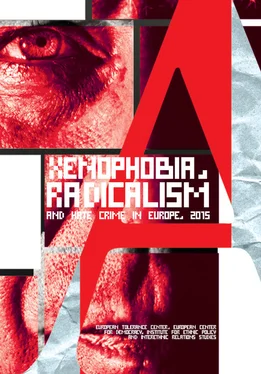It is worth mentioning the Law “On protecting religious feelings,” adopted by Russia in 2013. [5] Official title: Law “On introducing amendments to Article 148 of the Russian Criminal Code and several legislative acts in order to combat insults of religious beliefs and feelings of citizens”.
The law is characterised by its vague wording, essentially opening up the possibility of prosecuting criticism or disrespectful portrayal of religious organisations in art. For example, the law introduces the concept of “public actions displaying clear disrespect towards a community and committed in order to insult religious feelings” (Article 148.1 of the Criminal Code) [6] http://www.rg.ru/2013/06/30/zashita-site-dok.html
, but does not further expand on its meaning, which allows for misuse of the law, particularly towards atheists and members of “non-traditional” religions.
However, the most significant problems in European legislation are laws regulating inter-ethnic relations.
There are several countries in Europe that do not recognise t he presence of ethnic minorities as such, which deprives them of corresponding rights that may differ from the regular human rights. Ethnicity and self-determination of minorities are excluded from the legal and political vocabulary in countries like France and Greece (excluding Western Thrace). The argument for this practice is that granting “special rights” to certain national minorities would escalate racism and inequality on ethnic grounds. Thus, France and Greece have been reluctant to join the Framework Convention for the Protection of National Minorities and the European Charter for Regional or Minority Languages. Meanwhile, de facto national minorities in France and Greece constitute for at least 10 % of their populations. Their presence is officially unrecognised, and therefore, their rights are not protected.
This problem exists in various shapes and forms in other monitored countries, except Russia, which has more than one hundred different nationalities. However, Russia adopted a completely different nation-state model, which it inherited from the Soviet Union as a state founded on an idea, rather than traditions of the titular nation.
Non-indigenous peoples – particularly immigrants – are affected by this the most. However, there also millions of citizens in Germany, for example, who were born in these countries, but not recognised as national minorities due to not identifying themselves as any of the 4 accepted ethnic groups. These are Turks, former Yugoslavians and people of Asian and African origins, who are excluded from the Framework Convention.
These factors indicate that the rights of most national minorities in Europe are not observed on a legislative level.
1.2. Changes to counter-extremism and minority rights legislation
Legislative changes in Europe this year were predominantly aimed at solving the following issues: a) rapid illegal immigration; b) integration of legal immigrants; c) social radicalisation; d) terrorism. This was done by introducing tougher migration and anti-racism legislation, and combating various forms of hate crime. The European Union also continued to liberalise LGBT relations. However, countering terrorism has been the main objective of European legislators in recent years.
France, which has the highest number of radical Islamist groups in the European Union and has suffered most from extremism in the region, had adopted a Security and Counter Terrorism Act in December 2012. The law provided for much tougher punishment for people complicit in terrorist activities. [7] https://www.legifrance.gouv.fr/affichTexte.do?cidTexte=JORFTEXT000026809719&categorieLien=id
On November 4, 2014, France adopted another counter-terrorism law that allowed its authorities to confiscate passports and prohibit exit for people who are leaving for Syria and Iraq with the intention to join radical Islamist organisations. The law also allowed for extra-judicial blocking of Islamist websites. [8] https://www.legifrance.gouv.fr/affichTexte.do?cidTexte=JORFTEXT000029754374&categorieLien=id
In 2015, France furthered its anti-extremism legislation by adopting a surveillance act (July 24, 2015), which among other things allowed the security services to plant so-called “black boxes” at internet service providers in order to “monitor traffic and suspicious behavioural patterns through the real-time analysis of metadata.” [9] Loi n° 2015-912 du 24 juillet 2015 relative au renseignement , https://www.legifrance.gouv.fr/affichTexte.do?cidTexte=JORFTEXT000030931899&categorieLien=id
Note that the French were particularly critical of the United States Counter Terrorism Act, adopted following the 9/11 attacks and containing similar provisions. Thus, following the adoption of the French counterpart of the Act, President François Hollande sent the bill for the approval of the Constitutional Council, which found it corresponded to the French Constitution. [10] Décision n° 2015-713 DC du 23 juillet 2015 – Loi relative au renseignement, http://www.conseil-constitutionnel.fr/conseil-constitutionnel/francais/les-decisions/acces-par-date/decisions-depuis-1959/2015/2015-713-dc/communique-de-presse.144139.html
This was an unprecedented step since the Council’s establishment in 1958.
It is fair to say that French and American anti-extremism legislation formed the model for counter terrorism legislation in many countries around the world.
In 2015, Germany [11] http://statewatch.org/news/2015/jul/germany-terror-laws.html
and the United Kingdom [12] http://www.publications.parliament.uk/pa/bills/cbill/2014-2015/0127/en/15127en.htm
adopted new counter terrorism acts. Italy and the Netherlands also tightened their counter terrorism legislation during the monitored period. [13] http://www.nctv.nl/onderwerpen/tb/actieprogramma-integrale-aanpak-jihadisme/
In 2016, Russia is to follow their example. [14] http://static.kremlin.ru/media/events/files/ru/Q7t146BkLNBDUXEsAPvOdb44JdrQPQPt.pdf
In 2015, Russia had increased fines for the production of media containing the justification of, or public calls for, terrorist or extremist activities [15] http://base.garant.ru/71001234/#ixzz3iUYmRMdT
.
Analysing modern European counter terrorism legislation reveals several of its key elements:
1. Possibility of temporary border control or closure.
2. Introduction of pre-trial ban on travel and confiscation of travel documents, based on security intelligence.
3. Legalisation of internment, deprivation of citizenship, and deportation of persons complicit in terrorist activity (amendments to the Citizenship Act of the Netherlands allows for the annulment of citizenship in the interest of national security).
4. Increased online surveillance.
5. Tougher measures to combat the funding of terrorist activities.
6. Closer monitoring of suspicious activity or behaviour through cooperation with ISPs, transport, medical and other services.
7. Bans on social welfare for so-called “Jihadi tourists.”
Another group of legislative changes in Europe in 2015 focused migration flows.
In July 2015, Germany tightened its Refugee Act, introducing criminal liability for providing false information when seeking asylum. Illegal migrants can not only be arrested, but also have their passports taken away until further notice. Federal Minister of the Interior Thomas de Maizière (Christian Democratic Union) said that strict treatment of new migrants is necessary to ensure that the public agrees with immigration and entry of people who are really in need of Germany’s protection. [16] http://www.spiegel.de/international/germany/germany-registers-sharp-increase-in-attacks-on-asylumseekers-a-1045207.html
Читать дальше












